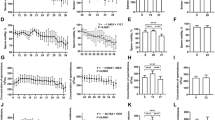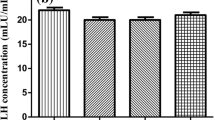Abstract
Resveratrol (3,5,4'-trihydroxystilbene, RSV) has been widely used in mammalian cells, but whether it can be used during freezing boar semen is still unknown. The effects of RSV treatment during boar semen freezing on its anti-freezing ability, apoptosis, and possible apoptotic pathways were observed in this study. Sperm motility, mitochondrial membrane potential (ΔΨm), adenosine triphosphate (ATP) content, terminal deoxynucleotidyl transferase (TdT)-mediated dUTP nick-end labeling (TUNEL)-positive apoptotic state, and messenger RNA (mRNA) expression levels of apoptotic genes involved in different apoptotic pathways after freezing with or without RSV treatment were tested. The results showed that: (1) Compared with fresh sperm, the motility, normal acrosome rate, and plasma membrane integrity rate of frozen boar sperm decreased significantly (P<0.05), and RSV did not significantly increase the sperm motility (0.44 vs. 0.40, P>0.05), but it did significantly improve the normal acrosome rate (57.65% vs. 47.00%, P<0.05) and plasma membrane integrity rate (46.67% vs. 38.85%, P<0.05). (2) After freezing, most boar sperm showed low mitochondrial ΔΨm. RSV treatment could increase the rate of high mitochondrial ΔΨm of boar sperm. (3) RSV treatment significantly decreased reactive oxygen species (ROS) levels (58.65% vs. 88.41%, P<0.05) and increased the ATP content (0.49 μmol/L vs. 0.25 μmol/L, P<0.05) of boar sperm during freezing. (4) The apoptotic rate of the freezing group (80.41%) with TUNEL detection increased significantly compared to the fresh group (9.70%, P<0.05), and RSV treatment greatly decreased the apoptotic rate (68.32%, P<0.05). (5) Real-time polymerase chain reaction (RT-PCR) showed that not only the genes from the death receptor-mediated apoptotic pathway (tumor necrosis factor-α (TNF-α), Fas ligand (FasL), and Caspase-8), but also the genes from the mitochondria-mediated apoptotic pathway (manganese superoxide dismutase (MnSOD), B-cell lymphoma 2 (Bcl-2), Bcl-2-associated X protein (Bax), and Caspase-9) were both significantly changed after freezing. RSV treatment during freezing greatly changed their expression levels. Although RSV treatment during boar semen freezing did not significantly increase motility after thawing, it still played an efficient antioxidant role, which could enhance the mitochondrial function and decrease the apoptotic level induced by both the death receptor- and mitochondria-mediated apoptotic pathways.
概要
目的:阐明白藜芦醇(RSV)在猪精液冷冻保存中的应用效果及作用机制。
创新点在冷冻过程中添加RSV,观察其对猪冻后精子抗 冻能力的影响,并阐明其细胞凋亡作用机理。
方法:在猪精液的冷冻和解冻过程中添加1 mmol/L RSV,解冻后检测精子活力、线粒体膜电位、腺 苷三磷酸(ATP)含量、凋亡水平和凋亡通路中 相关基因的表达情况。
结论:(1)与鲜精相比,冷冻精液的活力、顶体完整 性和质膜完整性均显著降低,冷冻前后RSV 处理 未能显著提高精子活力(0.44 vs. 0.40,P>0.05), 但能显著提高顶体完整性(57.65% vs. 47.00%, P<0.05)和质膜完整性(46.67% vs. 38.85%, P<0.05)。(2)解冻后精子线粒体膜电位显著下 降,RSV 的添加能提高精子膜电位水平。 (3)冷冻解冻过程中添加RSV 能显著降低精子 的活性氧(ROS)水平(58.65% vs. 88.41%, P<0.05),增加精子的ATP 含量(0.49 μmol/L vs. 0.25 μmol/L,P<0.05)。(4)TUNEL 凋亡检测 后,冷冻精子的凋亡率(80.41%)与鲜精组 (9.70%)相比显著增加(P<0.05),RSV 处理 能显著降低冻精的凋亡比例(68.32%,P<0.05)。 (5)实时荧光定量聚合酶链反应(qRT-PCR) 的结果显示,猪精液冷冻后,无论是死亡受体介 导凋亡途径中的相关基因(肿瘤坏死因子α (TNF-α)、TNF 受体超族配体(FasL)和半胱 氨酸的天冬氨酸蛋白水解酶8(Caspase-8)), 还是线粒体介导凋亡途径中的相关基因(锰超氧 化物歧化酶(MnSOD)、B 淋巴细胞瘤-2(Bcl-2)、 Bcl-2 相关X 蛋白质(Bax)和半胱氨酸的天冬氨 酸蛋白水解酶9(Caspase-9)),均产生明显变 化,RSV 添加亦能显著改变其表达水平。综上所 述,猪精液冷冻解冻过程中RSV 添加虽未能显著 提高精子活力,但仍表现为抗氧化保护效果,体 现在改善了线粒体功能,并通过改变死亡受体和 线粒体介导的凋亡途径中相关基因的表达水平, 降低了冻后精子的细胞凋亡。
Similar content being viewed by others
References
Aitken RJ, Koppers AJ, 2011. Apoptosis and DNA damage in human spermatozoa. Asian J Androl, 13(1):36–42. https://doi.org/10.1038/aja.2010.68
Awda BJ, Mackenzie-Bell M, Buhr MM, 2009. Reactive oxygen species and boar sperm function. Biol Reprod, 81(3):553–561. https://doi.org/10.1095/biolreprod.109.076471
Branco CS, Garcez ME, Pasqualotto FF, et al., 2010. Resveratrol and ascorbic acid prevent DNA damage induced by cryopreservation in human semen. Cryobiology, 60(2):235–237. https://doi.org/10.1016/j.cryobiol.2009.10.012
Bucak MN, Ataman MB, Baspinar N, et al., 2015. Lycopene and resveratrol improve post-thaw bull sperm parameters: sperm motility, mitochondrial activity and DNA integrity. Andrologia, 47(5):545–552. https://doi.org/10.1111/and.12301
Collodel G, Federico MG, Geminiani M, et al., 2011. Effect of trans-resveratrol on induced oxidative stress in human sperm and in rat germinal cells. Reprod Toxicol, 31(2):239–246. https://doi.org/10.1016/j.reprotox.2010.11.010
Dai JJ, Wu CF, Zhang DF, et al., 2009. Some factors affecting freezing of boar semen in 5 mL maxi-straws. Asian Australas J Anim Sci, 22(4):507–515. https://doi.org/10.5713/ajas.2009.80543
Dai JJ, Wu CF, Muneri CW, et al., 2015. Changes in mitochondrial function in porcine vitrified MII-stage oocytes and their impacts on apoptosis and developmental ability. Cryobiology, 71(2):291–298. https://doi.org/10.1016/j.cryobiol.2015.08.002
Dai JJ, Niu YF, Wu CF, et al., 2016. Both death receptor and mitochondria mediated apoptotic pathways participated the occurrence of apoptosis in porcine vitrified MII stage oocytes. Cryo Letters, 37(2):129–136.
de Oliveira MR, Nabavi SF, Manayi A, et al., 2016. Resveratrol and the mitochondria: from triggering the intrinsic apoptotic pathway to inducing mitochondrial biogenesis, a mechanistic view. Biochim Biophys Acta Gen Subj, 1860(4):727–745. https://doi.org/10.1016/j.bbagen.2016.01.017
Gadea J, Sellés E, Marco MA, et al., 2004. Decrease in glutathione content in boar sperm after cryopreservation: effect of the addition of reduced glutathione to the freezing and thawing extenders. Theriogenology, 62(3-4):690–701. https://doi.org/10.1016/j.theriogenology.2003.11.013
Garcez ME, dos Santos Branco C, Lara LV, et al., 2010. Effects of resveratrol supplementation on cryopreservation medium of human semen. Fertil Steril, 94(6):2118–2121. https://doi.org/10.1016/j.fertnstert.2010.01.058
Green DR, Reed JC, 1998. Mitochondria and apoptosis. Science, 281(5381):1309–1312. https://doi.org/10.1126/science.281.5381.1309
Gürler H, Malama E, Heppelmann M, et al., 2016. Effects of cryopreservation on sperm viability, synthesis of reactive oxygen species, and DNA damage of bovine sperm. Theriogenology, 86(2):562–571. https://doi.org/10.1016/j.theriogenology.2016.02.007
Hsuuw YD, Chan WH, Yu JS, 2013. Ochratoxin a inhibits mouse embryonic development by activating a mitochondriondependent apoptotic signaling pathway. Int J Mol Sci, 14(1):935–953. https://doi.org/10.3390/ijms14010935
Jeulin C, Soufir JC, Weber P, et al., 1989. Catalase activity in human spermatozoa and seminal plasma. Gamete Res, 24(2):185–196. https://doi.org/10.1002/mrd.1120240206
Kefer JC, Agarwal A, Sabanegh E, 2009. Role of antioxidants in the treatment of male infertility. Int J Urol, 16(5):449–457. https://doi.org/10.1111/j.1442-2042.2009.02280.x
Li ZL, Lin QL, Liu RJ, et al., 2010. Protective effects of ascorbate and catalase on human spermatozoa during cryopreservation. J Androl, 31(5):437–444. https://doi.org/10.2164/jandrol.109.007849
Luño V, Gil L, Olaciregui M, et al., 2014. Rosmarinic acid improves function and in vitro fertilising ability of boar sperm after cryopreservation. Cryobiology, 69(1):157–162. https://doi.org/10.1016/j.cryobiol.2014.07.002
Martinez-Soto JC, de DiosHourcade J, Gutiérrez-Adán A, et al., 2010. Effect of genistein supplementation of thawing medium on characteristics of frozen human spermatozoa. Asian J Androl, 12(3):431–441. https://doi.org/10.1038/aja.2009.92
Mukherjee A, Malik H, Saha AP, et al., 2014. Resveratrol treatment during goat oocytes maturation enhances developmental competence of parthenogenetic and handmade cloned blastocysts by modulating intracellular glutathione level and embryonic gene expression. J Assist Reprod Genet, 31(2):229–239. https://doi.org/10.1007/s10815-013-0116-9
Ou XH, Li S, Wang ZB, et al., 2012. Maternal insulin resistance causes oxidative stress and mitochondrial dysfunction in mouse oocytes. Hum Reprod, 27(7):2130–2145. https://doi.org/10.1093/humrep/des137
Pasqualotto FF, Gupta S, Borges E Jr, et al., 2006. Impact of agriculture on semen quality and oxidative stress amongst infertile couples. Fertil Steril, 86(3):S445–S446. https://doi.org/10.1016/j.fertnstert.2006.07.1230
Perchec G, Jeulin C, Cosson J, et al., 1995. Relationship between sperm ATP content and motility of carp spermatozoa. J Cell Sci, 108(2):747–753.
Qiu Y, Wang LG, Jia YF, et al., 2011. Effects of the crude extract of Polygala tenuifolia Willd on human sperm in vitro. J Zhejiang Univ-Sci B (Biomed & Biotechnol), 12(6):448–454. https://doi.org/10.1631/jzus.B1000347
Schäfer S, Holzmann A, 2000. The use of transmigration and Spermac stain to evaluate epididymal cat spermatozoa. Anim Reprod Sci, 59(3-4):201–211. https://doi.org/10.1016/s0378-4320(00)00073-7
Scott FL, Stec B, Pop C, et al., 2009. The Fas-FADD death domain complex structure unravels signalling by receptor clustering. Nature, 457(7232):1019–1022. https://doi.org/10.1038/nature07606
Shimizu K, Miyagi S, Miyazawa K, et al., 2016. Resveratrol prevents warm ischemia-reperfusion injury in liver grafts from non-heart-beating donor rats. Transplan Proc, 48(4):1221–1225. https://doi.org/10.1016/j.transproceed.2015.11.031
Silva ECB, Cajueiro JFP, Silva SV, et al., 2012. Effect of antioxidants resveratrol and quercetin on in vitro evaluation of frozen ram sperm. Theriogenology, 77(8):1722–1726. https://doi.org/10.1016/j.theriogenology.2011.11.023
Tao ZH, Li C, Xu XF, et al., 2019. Scavenging activity and mechanism study of ferulic acid against reactive carbonyl species acrolein. J Zhejiang Univ-Sci B (Biomed & Biotechnol), 20(11):868–876. https://doi.org/10.1631/jzus.B1900211
Toni LS, Garcia AM, Jeffrey DA, et al., 2018. Optimization of phenol-chloroform RNA extraction. MethodsX, 5:599–608. https://doi.org/10.1016/j.mex.2018.05.011
Trzcinska M, Bryla M, Gajda B, et al., 2015. Fertility of boar semen cryopreserved in extender supplemented with butylated hydroxytoluene. Theriogenology, 83(3):307–313. https://doi.org/10.1016/j.theriogenology.2014.07.045
Zeng CJ, Tang KY, He L, et al., 2014. Effects of glycerol on apoptotic signaling pathways during boar spermatozoa cryopreservation. Cryobiology, 68(3):395–404. https://doi.org/10.1016/j.cryobiol.2014.03.008
Acknowledgments
We thank Dr. Da-wei YAO (College of Veterinary Medicine, Nanjing Agricultural University, Nanjing, China) for editing of the manuscript.
Author information
Authors and Affiliations
Contributions
Wei-hua HE, Xiu-jun DUAN, and He-shuang DI performed the experimental research and data analysis, wrote and edited the manuscript. Xiao-hu ZHAI participated in the study design, data analysis, and writing and editing of the manuscript. All authors have read and approved the final manuscript and, therefore, have full access to all the data in the study and take responsibility for the integrity and security of the data.
Corresponding author
Additional information
Compliance with ethics guidelines
Wei-hua HE, Xiao-hu ZHAI, Xiu-jun DUAN, and Heshuang DI declare that they have no conflict of interest. All institutional and national guidelines for the care and use of laboratory animals were followed.
Project supported by the Jiangsu Agri-animal Husbandry Vocational College Academy Research Project (No. NSF201509) and the Jiangsu University Brand Speciality Construction Work Founded Project (No. PPZY2015C230), China
Rights and permissions
About this article
Cite this article
He, Wh., Zhai, Xh., Duan, Xj. et al. Effect of resveratrol treatment on apoptosis and apoptotic pathways during boar semen freezing. J. Zhejiang Univ. Sci. B 21, 485–494 (2020). https://doi.org/10.1631/jzus.B1900520
Received:
Revised:
Accepted:
Published:
Issue Date:
DOI: https://doi.org/10.1631/jzus.B1900520




